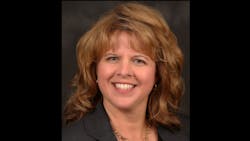Facing parts—and life—challenges head-on
Tina Hubbard admits she never set out to be the first female CEO for HDA Truck Pride. It was the satisfaction of making a contribution and finding solutions in a relationship-driven industry that made her fall in love with heavy-duty sales and succeed in the commercial vehicle aftermarket.
With her career starting in sales at parts supplier Federal-Mogul, she found fulfillment not in the products she sold but in getting to know her customers and helping them relieve their specific pain points.
“That’s what became my passion and to continuously learn more and expand,” Hubbard said. “It wasn't just the widgets that we sold, but it was even beyond that what impacts those widgets. Now you're looking at all these other things that make this entire industry, that brought more relevancy to the task at hand. My little task at hand.”
Going in, she said she knew nothing about heavy-duty trucks or their importance in the big picture—only that she avoided driving next to them on the highway, especially in the rain. Even as recently as 2020, she said that, for her, a whole new spin was put on the industry when it was deemed essential during COVID-19 shutdowns. “Still not glamorous,” but essential.
“It was Friday the 13th. I’ll never forget it,” she said about the CDC’s announcement of COVID lockdowns. “A week later, the Auto Care Association gave us the insight, ‘Hey, our industry is deemed as essential because, without trucking, we can’t get anything done. We can't get food, medicine, water supplies of any kind. We’re essential.’ If you bought it, a truck brought it.”
See also: Women in Transportation 2023
HDA Truck Pride’s mission to inspire people to grow and realize their full potential mirrored her personal drive to advance in a field where she was faced with a huge learning curve.
“The biggest (challenge) for me was having confidence,” she said. “It was learning things so that I felt confident enough about whatever the topic might be. If it were parts—and I sold brakes—I wanted to know more about the air brake system, so I'd go take a class. And this was before the internet.”
Taking classes, sometimes weeklong classes in another state, was just one piece of the puzzle. Hands-on experience from role models coming alongside her was where she found that confidence to keep moving forward.
“I'll never forget walking up to one of my customers saying, ‘I need a favor,’” she said of Dick Holloway, branch manager at Power Train Service in Lexington, Kentucky. “And I said, ‘You know, we sell you all these bearings and seals for transmissions and differentials, and you guys talk about this stuff like you know what you're doing. Can I work in your shop for a week, or a few days? It'll click better for me if I do it with your folks.’”
Holloway was reminded of his own daughter when he spoke with Hubbard, so he was kind enough to let her work in his shop for two days—but, of course, he didn’t turn around and sell the specific units she worked on to customers, she added with a smile.
She stressed that her challenges weren’t necessarily because she was a woman but because she had a lot to learn about trucks and truck parts, adding that the commercial vehicle industry isn’t for everyone, whether male or female.
“I'm very thankful for what we've seen in this industry so far,” she said looking back to her early days in the male-dominated industry. “There were not a lot of women in the industry. And I don't know, quite honestly, how many women wanted to be in the industry at that time.”
She also noted she’s seeing a shift away from the 1980s and 1990s mindset of men earning higher positions or more prestigious titles simply based on their years with the company, and women naturally taking on roles of administrative assistants “just planning the stuff and ordering the food.”
“It's more about who deserves it, who wants it, and who's proven themselves,” she said. “My initial ask probably 10 or 15 years ago was just to give women a seat at the table to prove what they're capable of. And I hate to be the one that says, ‘Oh, she got that job because she's female. These other two people were more appropriate for it, but she got it because she's a girl.’ I don't like to see that either.”
Her advice for anyone entering the industry is, “Be you. Do what you want to do, and find your people that will help you. Then be confident and learn.”
